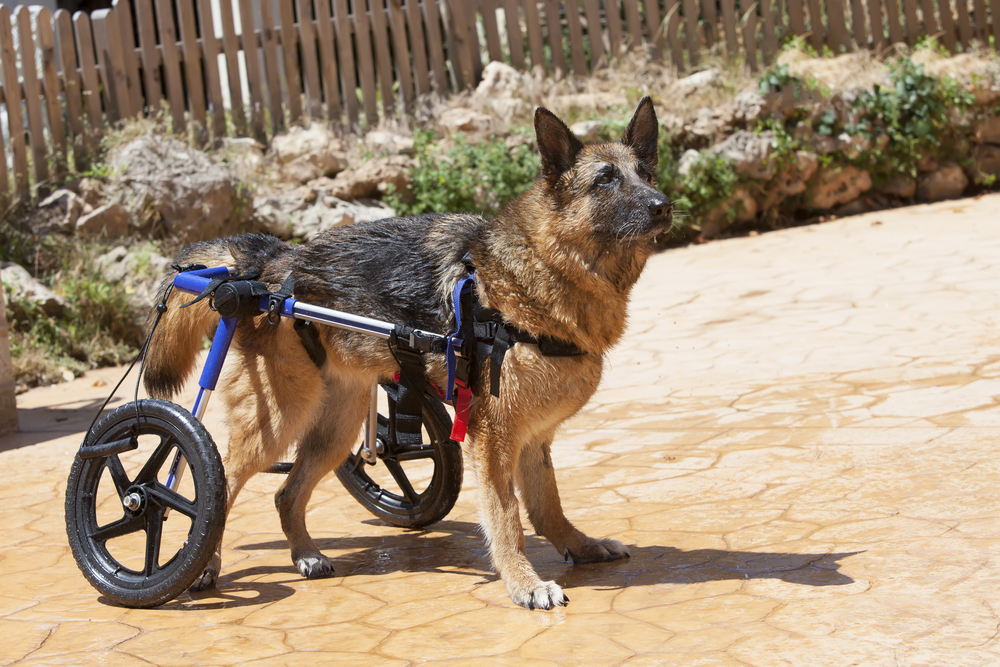Understanding the Needs of German Shepherds with Disabilities
German Shepherds are celebrated for their intelligence, versatility, and loyalty, but they are not immune to disabilities. Disabilities in German Shepherds can arise due to genetics, injuries, aging, or medical conditions. While these challenges may seem daunting, with the right understanding and care, German Shepherds with disabilities can still lead happy, fulfilling lives.
This guide explores the specific needs of German Shepherds with disabilities and provides actionable advice to help them thrive.
Common Disabilities in German Shepherds
Hip Dysplasia
Cause: Genetic predisposition is a common reason for hip dysplasia in German Shepherds. It involves the abnormal development of the hip joint, leading to pain and mobility issues.
Symptoms: Difficulty in walking, stiffness, or reluctance to climb stairs or jump.
Management: Weight management, physical therapy, and medications can alleviate symptoms. In severe cases, surgery may be necessary.
Degenerative Myelopathy
Cause: A progressive spinal cord disease often found in German Shepherds, typically affecting dogs aged 8 years or older.
Symptoms: Weakness in the hind legs, difficulty standing, or dragging of the back paws.
Management: Regular physical therapy, assistive devices like wheelchairs, and a high-quality diet can help manage the condition.
Blindness or Vision Impairment
Cause: Cataracts, progressive retinal atrophy (PRA), or trauma.
Symptoms: Bumping into objects, difficulty navigating stairs, or hesitation in unfamiliar surroundings.
Management: Providing a consistent environment, using scents to guide them, and incorporating verbal cues can help.
Deafness
Cause: Congenital issues, age-related changes, or ear infections.
Symptoms: Lack of response to commands or sounds, confusion in noisy environments.
Management: Training with hand signals, vibrations, and visual cues can aid communication.
Amputations or Mobility Impairments
Cause: Severe injuries, cancer, or birth defects.
Symptoms: Obvious limb loss or difficulty moving.
Management: Prosthetics, wheelchairs, and regular exercises to strengthen remaining limbs.
Creating an Adaptable Living Environment
Accessibility Adjustments
For German Shepherds with mobility issues:
Install ramps for stairs or high furniture.
Use non-slip rugs to prevent slipping on smooth floors.
Provide a comfortable orthopedic bed to reduce joint pressure.
Safety for Vision-Impaired Dogs
Avoid rearranging furniture to keep pathways consistent.
Use baby gates to block off hazardous areas like staircases.
Apply scents to important items (food bowls, beds) for easier identification.
Accommodations for Deaf Dogs
Use flashing lights or vibrations (such as tapping the floor) to get their attention.
Ensure they are on a leash or in a secure area to prevent accidents since they can’t hear approaching dangers.
Specialized Training for Dogs with Disabilities
Hand Signal Training For deaf German Shepherds, consistent hand signals can effectively replace verbal commands. Basic commands like sit, stay, and come can be taught using visual gestures.
Positive Reinforcement Use treats, toys, or affection to reward desired behavior. For dogs with hearing or vision impairments, rely on physical touch or scent-based rewards.
Adaptive Tools
Mobility Harnesses: Provide support for dogs with weak limbs or recovering from injuries.
Clickers or Whistles: For vision-impaired dogs, these tools can help establish routines when combined with scents or touch.
Physical and Mental Stimulation
Exercise for Mobility-Impaired Dogs
Water Therapy: Swimming is an excellent low-impact exercise for dogs with joint or spinal issues.
Short Walks: Frequent but shorter walks can help maintain mobility without overexertion.
Wheelchairs or Prosthetics: Assistive devices can restore freedom of movement and enhance quality of life.
Mental Enrichment
Mental stimulation is crucial, especially for dogs with physical disabilities:
Interactive Toys: Use puzzle feeders or scent-based toys to engage their senses.
Training Games: Simple games like hide-and-seek can keep them entertained and mentally sharp.
Health Management
Routine Vet Visits Regular check-ups are vital for monitoring and managing chronic conditions. Discuss specialized diets, medications, and physical therapy options with your veterinarian.
Pain Management For conditions like hip dysplasia or degenerative myelopathy, pain management is critical. Options include:
Nonsteroidal anti-inflammatory drugs (NSAIDs)
Joint supplements like glucosamine and chondroitin
Acupuncture or laser therapy for chronic pain relief
Dietary Adjustments
A high-quality, balanced diet supports overall health.
Incorporate omega-3 fatty acids to reduce inflammation.
For overweight dogs with mobility issues, a calorie-controlled diet can alleviate joint stress.
Emotional Support and Bonding
Patience and Understanding
German Shepherds are sensitive and may become anxious or frustrated due to their limitations. Owners must provide patience and reassurance to build their confidence.
Daily Interaction
Engage your dog with activities they can enjoy, such as gentle brushing, cuddling, or playing with adaptive toys. Positive interactions strengthen your bond and improve their overall well-being.
Socialization
Disabilities shouldn’t isolate your German Shepherd. Gradual socialization with other pets and people helps maintain their social skills and happiness.
Support for Owners
Caring for a German Shepherd with disabilities can be emotionally and physically demanding. Seek support when needed:
Online Communities: Join forums or social media groups for owners of dogs with disabilities to exchange tips and experiences.
Professional Assistance: Consider hiring a dog trainer or behaviorist experienced with special needs dogs.
Local Resources: Look for rehabilitation centers, therapy pools, or nonprofits that assist with disabled pets.
Celebrating Their Abilities
It’s essential to focus on what your German Shepherd can do rather than their limitations. Many disabled dogs display incredible resilience and adaptability. With the right care and environment, they can live happy, fulfilling lives that enrich the lives of their owners.
Conclusion
Understanding and addressing the needs of German Shepherds with disabilities is a rewarding journey. By making thoughtful adjustments, providing proper care, and celebrating their unique abilities, you can ensure they lead a happy and comfortable life. Remember, their loyalty and love remain unwavering, regardless of their physical challenges.
If you’d like to explore more tips and resources for German Shepherd care, visit The German Shepherd Breed Blog.
📘 Continue Exploring German Shepherd Ownership
→ What Is a German Shepherd?
→ German Shepherd Temperament & Personality
→ German Shepherd Training Fundamentals
→ German Shepherd Socialization & Early Development
→ Preparing Your Home for a German Shepherd Puppy


